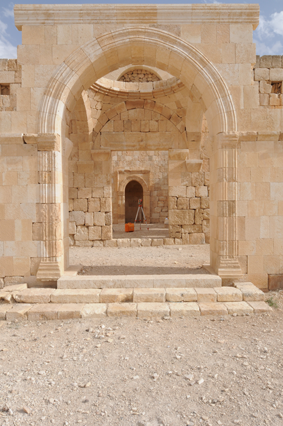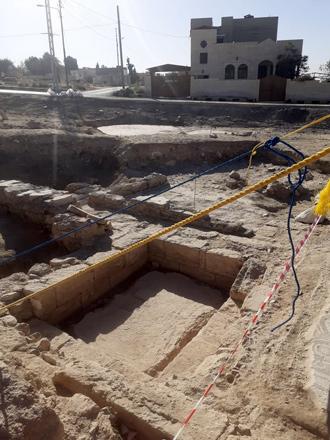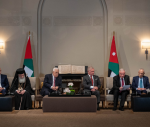You are here
Hammam as Sarrah offers window into early Islamic Art, student opportunities
By Saeb Rawashdeh - Aug 06,2023 - Last updated at Aug 06,2023

Hammam as Sarrah represents the example of Umayyad architectural jewel from the early Islamic period (Photo courtesy of Ignacio Arce)
AMMAN — The restoration of the Umayyad bathhouse “Hammam as Sarrah” was only recently completed after financial obstacles halted a 2009-2012 effort by a team of Spanish specialists to complete the project, commented project director Professor Ignacio Arce from the German-Jordanian University (GJU).
Hamman as Sarrah is part of the Qasr Al Hallabat, a well-known Umayyad desert castle and one of the oldest surviving Muslim bathhouses, located near Amman International Airport.
During the Spanish team’s initial work on the project, the site’s vaulting system, façades and a portion of the hydraulic system were restored, Arce said. “Regrettably, the financial crisis did not allow the intervention to be completed until years later,” he added.
“With financial support from the Gerda Henkel Stiftung foundation, I have been able — in recent years — to complete the restoration of the reception hall of Hammam as Sarrah using anastylosis [restoration using original fragments] of its unique entrance gate, and the restoration of its pavement,” Arce explained.
The design of the gate at Hammam as Sarrah uniquely features an elegant lintel from the tomb of a Roman high-rank commander [as the laurel crowns testify] with a series of mouldered pilasters that decorate the jambs of the gate, which represent the Umayyad artists’ attempt to radically depart from Classical Greco-Roman models.
“This attempt to create a new ‘Umayyad architectural language’, while combining its outcome with classical elements like the lintel itself, represents a fascinating insight of what could have been the evolution of Early Islamic Art if the Abbasid coup d’état did not interrupted and radically shifted its path in this formative stage,” Arce said.
The site’s pavement had almost completely been lost, as the only features remaining were the imprints of pink and cream-coloured stone tiles and marble slabs, he said. These valuable imprints, which provided the archaeological evidence of the original setting of the pavement, were carefully documented and protected with compacted sand. Then with a protective replica using some of the remaining tiles, the team was able to restore the original appearance of the hall.
Though the team’s achievement is important in providing a better understanding of Islamic Art’s formative stages, the project more importantly offers GJU students in the Architectural Conservation masters programme, which Arce helped found, the opportunity to participate in the documentation, research and design of the intervention and restoration project, he noted.
The practical and highly specialised training offered by the master programme, the only one of its kind in Jordan and a reference at regional level, provides students with a comprehensive theoretical education, combined with a unique hands-on practical training, Arce added.
“The level of specialisation gained by the students allow them to afterwards work with international projects working with foreign missions or intergovernmental institutions, the Department of Antiquities itself, or private architectural offices dealing with Heritage conservation in Jordan and abroad,” Arce highlighted.
According to Arce and his GJU colleagues, they are enthusiastically awaiting a new cohort of students to join the programme, which will reinforce the human resources Jordan needs to preserve its architectural heritage.
Related Articles
AMMAN — A relatively new approach in the discipline, the archaeology of architecture was at the heart of a recent lecture held as part of th
AMMAN — A team of archaeologists, restorers and students is currently working on the documentation and conservation of an early Islamic bath
AMMAN — Qusayr Amra, located approximately 80 kilometres east of Amman, is one of the desert castles typical for the early Islamic per



















